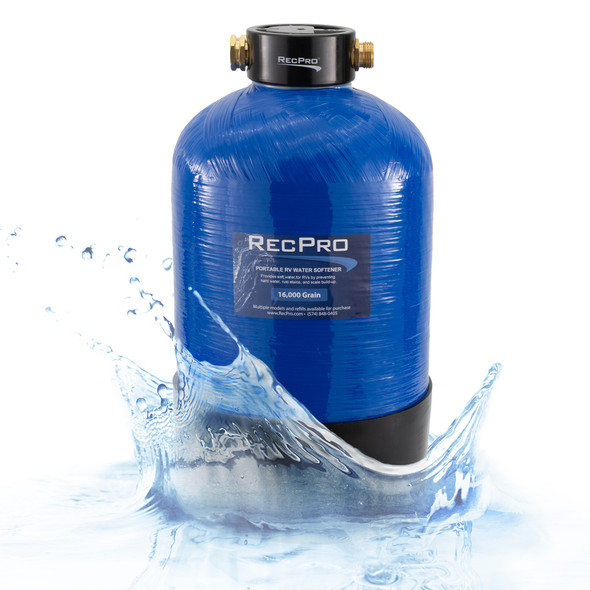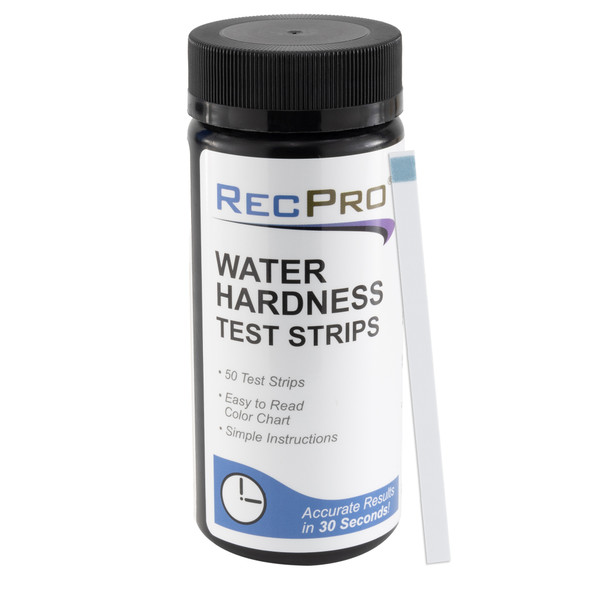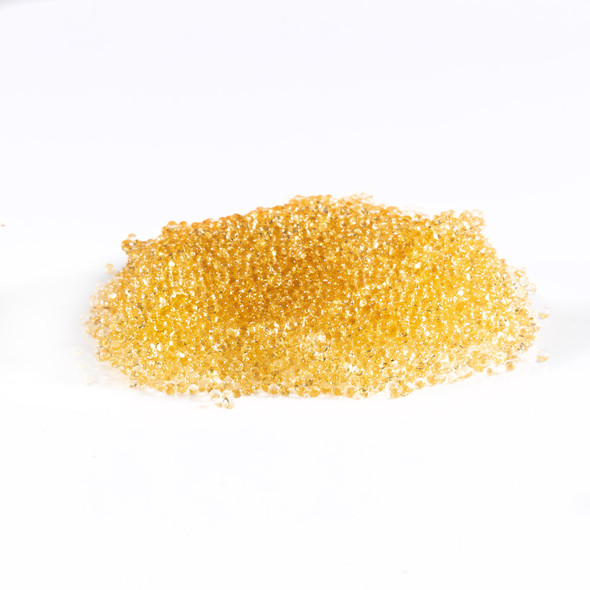No matter where it comes from, water naturally has a variety of minerals. From streams to pipes, it’s not likely you’ll find water that’s free from minerals unless it has been filtered and processed. Two of these minerals are calcium and magnesium and these minerals determine the “hardness” of the water. If there is a high amount of these minerals, the water is considered “hard”. If there is a low amount of these minerals or none at all, the water is considered “soft".
Water hardness is expressed in two ways: parts per million or grains per gallon. There is no requirement to soften your water whether you’re in a residential setting or in your RV. It really comes down to a personal choice that you make for your plumbing system, your health, and your preferences. As a note, though, if your hardness level is more than 7 grains per gallon, then you might need to add in a softener to keep your appliances running well and to improve the taste, smell, or look of the water.
Do You Have Hard Water?
So, how do you know if you have hard water? There are tests that you can do, but if you don’t want to use a kit or contact anyone about it, there are simpler ways to tell.
Stains on sinks and bathtubs-When you have hard water, it mixes with the soap and when it evaporates, it causes stains on the side of the tub or sink. These stains are mostly made up of the calcium and magnesium in the water.
Shampoos and soaps not lathering-interestingly, soap lathers in soft water better than in hard water. So if you’re confused as to why your shampoo isn’t lathering like it should, it might not be an issue with the shampoo. It could be the water
Stains on glasses and cutlery-When you rinse your dishes with hard water, the soap might be rinsed off, but the minerals in the water will dry on the dish, causing those water spots that are so frustrating to see.
Scratchy and faded towels-clothes, bed linen, and towels naturally fade over time. By using hard water to wash them, however, it speeds up the process, giving fabric a faded look and causing fabric that was once soft to become scratchy and unpleasant to the touch.
Scale deposits in pipes and appliances-the biggest issue caused by hard water is scaling and it’s also the most dangerous. The minerals in the water build up in the pipes and in appliances such as coffee makers, laundry machines, and other water-based appliances. This is dangerous because it can clog pipes, filters, fittings, and more. Due to the clogs, flow rates decrease over time, causing the scale to continue to build up.
Eventually, the pipes might break or wear out, causing leaks and further damage. Your dishwasher could start leaking because the valves can’t function as they should anymore. Water-based appliances will have a shorter lifespan with more maintenance issues. The one good thing about this effect of hard water is that it’s easy to spot. Lookin your kettle or coffee maker for these mineral deposits to identify hard water.
Dry hair and skin. While the cold can lead to itchy and dry skin, hard water can do the same. High amounts of calcium and magnesium can lead to dry skin and brittle hair that becomes prone to tangling. Because of this, you can find yourself with dandruff or itchiness, even with special shampoos to help.
Low water flow-Because of the clogging in the pipes due to scale, you can notice that the faucets don’t have as high of a water flow as they used to.
Your tap water tastes odd-The high amount of minerals in hard water often causes your tap water to taste metallic. And while this metallic taste might not be excessive, it can often be an unpleasant experience.
If you read any of these and said “yes, I think I do have that problem,” then you likely have hardwater and need a water softener. But what exactly do RV water softeners do?
How Do RV Water Softeners Work?
Camper water softeners are often one tank or container that is built into your water system, whether it’s for the full fresh water system or only for one part. Inside of the tank, there are resin beads that soften the water as the water flows through them. These resin beads remove the calcium and magnesium from the water and replace it with sodium (not salt, just sodium). Once through the beads, the water will be softer. The beads are not unlimited, though, and they will become spent after a time.
Once the beads have been spent, the water softener will no longer work. At this point, the camper water softener will need to go through a cycle known as regeneration. During this process, resin is backwashed with a salt solution. The brine is reverse flushed through the system, taking with it the calcium and magnesium ions that had been absorbed into the resin. Once the water softener has gone through regeneration, it can be used again
Your RV water softener is designed to last for years, however, it won’t last forever. The life of the water softener will depend mostly on how often it is used and how much water is being treated. There are, however, tips for further extending the lifespan of the water softener.
Make sure you maintain any filters you have before the water softener. It’s a good idea to place a filter before the softener, as the water coming into the water softener will be more gentle on the softener. To keep everything working well, make sure to check up on these filters regularly.
Make sure you are regenerating it when it needs it. By keeping up on the regeneration cycles, you can prevent build up from happening, which can cause the water softener to not work as well.
Don’t make your water softener work too hard. Similar to the first tip, make sure you aren’t using super tough water on the water softener. Also, try not to use the water softener constantly. In an RV, this might be easier to do, as it’s not often that you are constantly using water. Just keep in mind that by using the water softener constantly, you can wear it down faster.
Does Your RV Water Softener Need Replaced?
There are several signs that you can catch that will let you know that your water softener needs to be replaced.
Your soap has difficulty lathering-Whether this means the soap doesn’t lather at all or that it takes a significantly greater amount of water to get the lather you’re wanting, this lack of lather means that the water is not as soft as it once was. This could be an issue that can be resolved by regenerating the softener, however, it can also mean it’s time to replace it entirely.
Laundry feels stiff and dull-When the water goes from soft to hard, you can notice this in your laundry, as washing your clothing in hard water can leave them dull and stiff, not feeling as soft as they used to feel.
You notice scaly buildup on water fixtures-If you have a water softener and yet you notice scale build up, chances are you need a new one. This could be a simple case of regeneration needed, but the water softener does at least need to be checked out for the issue.
Changes in water feel, taste, and pressure-If you notice that the water from your faucets feels or tastes different or has a lower flow rate than it used to, this is an issue. This means that your water softener is no longer working. You can try regeneration and this may fix the problem, however, if the softener is old, you may need a new unit.
Advantages and Disadvantages of an RV Water Softener
Advantages:
Water softeners are great because they prevent the build up on your pipes, fixtures, and hot water heater that can cause serious damage if left untreated. This lengthens the life of your appliances and creates lower maintenance costs as a result. Because of the better life and efficiency of these appliances, your energy bills will stay lower as well.
Because of the lack of calcium and magnesium in the water, those pesky water spots will disappear from your glasswater, leaving them clean and sparkling. This will also reduce or prevent the soap films and detergent curds from building up in sinks, bathtubs, and washing machines. Soft water mixes better with soaps and detergents and because of this, it helps them lather better, helping you to use less soap to clean your hair or clothing and less time in the shower trying to rinse it out, saving you water as well.
Finally, your skin and hair will become smoother and softer, your fabrics will stay brighter and softer, and the tap water will taste and smell better than before. While these three might take some getting used to, once you’ve acclimated to the change, you’ll never want to go back.
Disadvantages:
Because soft water is more acidic, if you have metal pipes rather than PEX or other non- metallic tubing, it can cause some corrosion and wear on the pipes. Using a water softener also requires testing of the water and maintenance of the water softener as well as the cost of regeneration and the initial cost of the unit. Depending on your skill level, installation of the unit can also be a hassle
There are also some negative impacts to the environment from salt use, as the water used to regenerate the softener resin ends up as waste. The loss of mineral content can also be disconcerting for some people, as these minerals often create the tastes that many people are used to. Some people are also not a fan of the more slippery feel of the water
As a note, one important consideration when it comes to softening your water is the added sodium content. For many people, this is okay and you can drink the water just fine. If you have a condition that requires you to have a lower sodium diet, however, adding this extra sodium to your water might not be the best idea. If you do have to be careful with your sodium intake, we recommend either bringing along bottled water to drink or not connecting the water softener to the tap water system.
What are the Health Effects of Soft Water?
Skin
Hard water makes soap less effective and leaves behind a residue on the skin, which can make your skin feel dry and itchy. Many people notice the scum on their tubs that builds up but don’t realize that the same thing that causes that scum is on their skin, even after they’ve rinsed and dried. This thin layer causes dry skin and itching. In soft water, however, the soap lathers better and washes away easier, leaving you without that layer. Many people might be confused by this, as they step out of the shower and feel almost slimy.
What is actually happening is the natural oils from your body are able to moisturize your skin, as they weren’t stripped away by hard water. Because hard water strips this moisture from your skin, it can even cause existing conditions to become worse, such as eczema and acne. For acne specifically, soft water will help calm your skin down. When your skin becomes dry (such as after being in hard water), it increases oil production to make up for it, which can lead to acne.
The unwanted minerals in hard water can also cause a chemical reaction with this naturally occurring oil, clogging pores and causing breakouts. Soft water, on the other hand, won’t strip your skin of its natural oils, leading to clearer skin and fewer breakouts.
Hair
Just like with soap, shampoo isn’t as effective when used with hard water. It doesn’t lather as well and it doesn’t rinse out well, leaving your hair dull and difficult to style. It also tends to cause colored hair to fade faster. And just as it does with your skin, hard water can cause your scalp to become dry and itchy, even going as far as to leave you with dandruff. With soft water, you can keep your hair soft and shiny, saving you money on expensive shampoos and conditioners and money on your water bill as well.
Drinking Soft Water
There is debate as to whether soft water is okay to drink. The short answer is yes. Generally speaking, the sodium content in soft water isn’t high enough to cause any issues. Sodium is a natural part of our diets and because of this, there isn't a risk associated with drinking soft water. There are, however, two exceptions to this.
First, If you have a pre-existing condition that requires you to have a low-sodium diet. Because the water softening process involves sodium, make sure to consult your doctor on whether or not drinking softened water is healthy for you. Second, we don’t recommend using softened water for use in the reconstitution of infant formulas, as softened water could affect its fine nutritional balance due to the added sodium.














